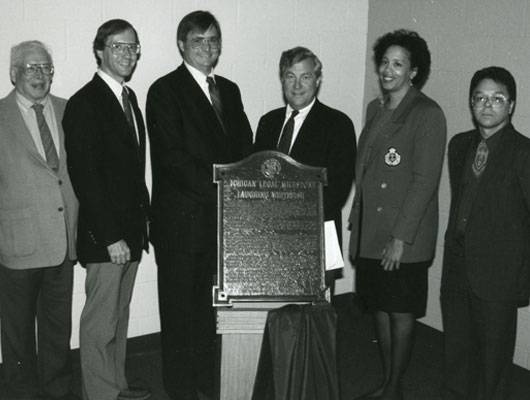Michigan Legal Milestones
16. Laughing Whitefish

The Michigan Supreme Court in 1889 recognized the legal validity of Native American tribal laws and customs. Dedicated and placed at Michigan Iron Industry Museum in Negaunee on August 25, 1992.
Complete Text on Milestone Marker
Laughing Whitefish
Marji-Gesick, a Chippewa chief, was hired in 1845 to locate a valuable iron ore deposit about three miles from here. He was paid with a certificate of interest entitling him to stock in the company. That action led to a landmark Michigan Supreme Court decision acknowledging that tribal laws and customs govern the legal affairs of Native American families.
After Marji-Gesick's death, his daughter, Charlotte Kawbawgam, found the certificate. When the Jackson Iron Company refused to recognize her ownership interest, she took the company to court.
The Michigan Supreme Court considered the company's claim that Charlotte Kawbawgam should not be recognized as Marji-Gesick's lawful heir because she had been born to one of the three women to whom her father had been married simultaneously. Polygamy was prohibited under Michigan law, but permitted under tribal laws and customs.
The Court concluded that since the marriage was valid under Chippewa law, it must be recognized by Michigan's courts. Charlotte Kawbawgam was declared Marji-Gesick's lawful heir, inheriting his ownership interest in the Jackson Iron Company.
The story of Marji-Gesick, Charlotte Kawbawgam, and the Jackson Iron Company was immortalized in Laughing Whitefish, a book authored by former Michigan Supreme Court Justice John Voelker under his pen name, Robert Traver.
Placed by the State Bar of Michigan and the Marquette County Bar Association, 1992.